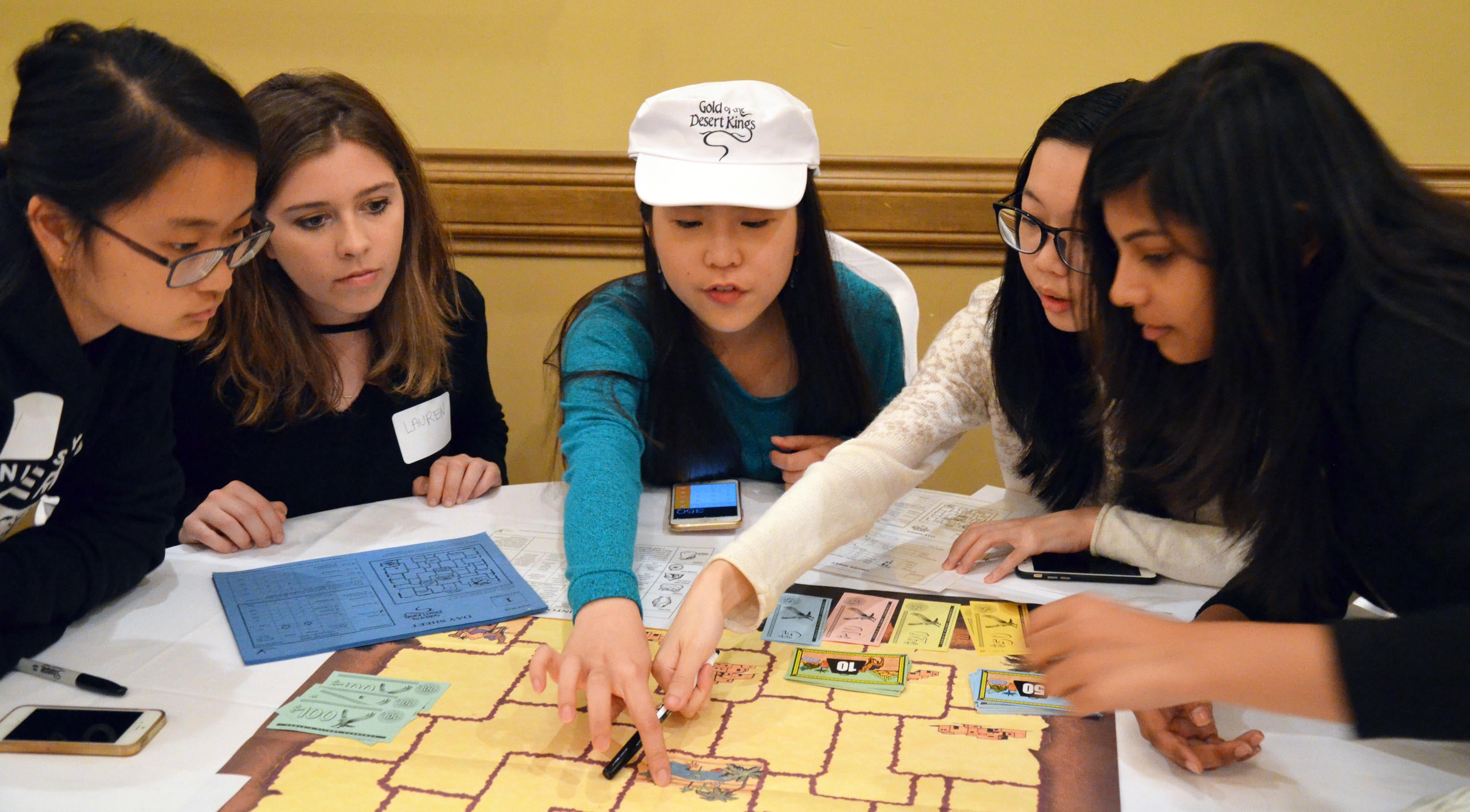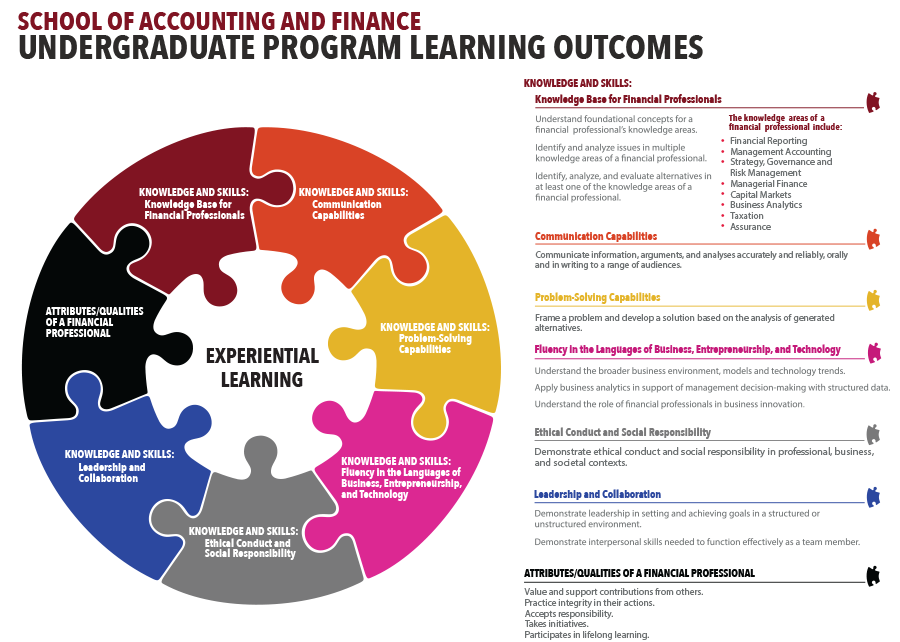
Our focus on experiential education starts with co-op education and extends into the classroom with a combination of authentic learning experiences and problem-based learning (PBL). These strategies are only possible thanks to our skilled faculty members, who have been recognized with a range of awards for excellence from the university’s Distinguished Teacher Award to awards from peers in academic accounting associations.
Co-operative education
Co-op has always been central to SAF’s strategy. Co-op is mandatory for all our SAF students. This immersive, interactive learning ensures that our students enter the job market with an enriched capacity for problem-solving, an ability to thrive under pressure, and the confidence that only comes from real-world experience. And this is important. In a world of accelerated change, organizations need graduates that can step in and assume leadership responsibilities from day one.
Authentic learning experiences
Student Investment Fund and Student Venture Fund
We launched the Student Investment Fund (SIF) in 2012 and the Student Venture Fund (SVF) in 2017. The SIF provides students with an educational experience in an institutional investor setting with hands-on training in equity valuation and portfolio management with guidance from industry experts and supervision from finance faculty. The SVF gives students an educational experience working closely with angels and venture capital firms to invest in early stage technology companies, evaluating founders, researching markets, and valuing new business ventures. Both the SIF and SVF give students the opportunity to learn how to make decisions when managing real investments in publicly-traded stocks and new business ventures.
Investment Research Challenge
The Investment Research Challenge is a one day competition open to students from 2B onwards. The competition requires a student team to analyze a publicly-traded stock in the tech sector and defend its buy/hold/sell recommendation. The competition is sponsored by Anish Chopra and the CPA-SAF Centre for Capital Markets Education.
Finance and Data Analytics Lab
The Finance Lab empowers students by giving them access to real-time financial resources and high-end analytic software. We use the lab for a range of courses including business analytics electives in which student teams extract and analyze real data to recommend business improvements for partner organizations.
International Study Program
In an ever-expanding internationalized business world, having an international perspective can enhance any business professional's acumen. The SAF International Study Trip is a condensed, 0.5-credit course offered to upper-year SAF students that provides the opportunity for students to visit - in person and/or virtually - international business centres to learn from business professionals and organizations directly involved in international business and specifically international finance and account.
Success Beyond the Classroom
SAF has created a workshop series titled “Success Beyond the Classroom” in partnership with accomplished SAF alumnus, Upkar Arora (MAcc ’85). The workshops connect students with successful SAF grads, gaining insights that help them develop personal balance sheets and career plans.
Our authentic learning experiences help students develop the analytical skills and confidence to make real-world decisions.
Problem-based learning (PBL)
The SAF is introducing PBL to help our students feel confident in the face of uncertainty and to develop the competencies needed to tackle whatever comes their way. We believe PBL is the logical extension of both the SAF’s and the University’s educational philosophy, and a new way to enrich and expand our students’ skill sets.
What might a PBL class look like?
- A small classroom, a team of 8 to 10 students meet with a facilitator who guides the peer to peer learning process
- The students are presented with an open-ended and unfamiliar problem so they cannot simply apply a formula to the problem
- Instead, the students must start with the most fundamental step in problem-solving—understanding and defining the problem. They must ask: What information do we need to solve this problem? Where will we find this information?
- The team develops a game plan, divvying up the tasks needed to solve the problem amongst themselves
- They complete these tasks in the interval between their team meetings. They then share their findings at the next team meeting, and over the course of a week, they develop a solution.
Undergraduate program learning outcomes
Undergraduate programs at SAF are designed to develop seven learning outcomes in our students, which prepare them for a careers as financial professionals.

Thinking and learning
At SAF we are committed to helping you become a lifelong learners, high performers, informed and intentional actors and network and community builders. We call this the SAF Mindset and it is supported by the behaviours of successful SAF students and future Accounting & Finance (A&F) professionals. Learning in SAF happens when you combine thee behaviours with the knowledge and skills you need to develop and the variety of opportunities and experiences you can choose to engage in.
We also believe in the importance and value of learning with and from your peers. While SAF has excellent professors to support your learning journey, your ability to learn with and from your peers will prepare you for the collaborative work environments that A&F professionals are a part of.
Nailah, a former AFM student, says this about the value of asking questions:
There’s a misconception that asking for help is a form of weakness. This is far from the truth. Asking for help demonstrates confidence and is a key factor to personal success. Seeking help was the best decision I could have made; my grades went up and my stress level went down. I strongly encourage students to overcome this fallacy that only the weak ones ask for help. Those who strive and succeed are the ones who are willing to work hard and seek help to overcome personal obstacles.